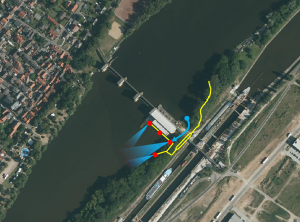Ecological Connectivity - Pilot Sites: Difference between revisions
From BAWiki
Lisa Deutsch (talk | contribs) mNo edit summary |
No edit summary |
||
| Line 1: | Line 1: | ||
[[de: Ökologische Durchgängigkeit - Pilotanlagen]] | [[de: Ökologische Durchgängigkeit - Pilotanlagen]] | ||
__NOAUTOLINKS__ | |||
[[file: Pilot.png|thumb|Eddersheim barrage (River Main): simplified design of fishway (yellow), entrance sites (red dots), attraction flow (blue triangles) and auxiliary flow conduit (blue arrow) source aerial view: © GeoBasis-DE/BKG 2017]] | [[file: Pilot.png|thumb|Eddersheim barrage (River Main): simplified design of fishway (yellow), entrance sites (red dots), attraction flow (blue triangles) and auxiliary flow conduit (blue arrow) source aerial view: © GeoBasis-DE/BKG 2017]] | ||
Latest revision as of 15:55, 26 March 2020

To investigate fish movement and flow characteristics it is necessary to observe fish in their natural habitat and execute hydraulic measurements (here the special focus is on the tailwater of hydro-electric plants). Therefore, BAW and BfG chose seven barrages with hydro-electric plants to be pilot sites for further investigations. The issues in question result from open questions encountered in the counseling of the WSV and still unsolved design problems regarding the state of the art. The focus is on the larger rivers in Germany (with hydro-electric power production) because the available design criteria in Germany rather center on small rivers and creeks. The investigation subjects and the corresponding methods are specified in the fishways R+D program.
Pilot sites are:
- Dörverden (River Weser),
- Koblenz and Lehmen (River Moselle),
- Eddersheim and Wallstadt (River Main),
- Kochendorf and Lauffen (River Neckar)
The Koblenz fishway was completed in 2012, the Lehmen fishway is under construction, the other fishways are in various planning stages including planning-approval/licensing procedure.
The necessary auxiliary water discharge for creating an adequate attraction flow relative to the discharge of the hydraulic power plant is to be investigated at Eddersheim, Wallstadt, Kochendorf und Dörverden. Furthermore, different entrance situations including geometric variations and connections to the river bed will be examined.
There will also be research on special topics in the design of vertical slot passes such as slot width, slope of the fish pass, flow patterns and the effects of pass length. At Eddersheim parallel structures are proposed to compare different pool sizes and also different pass types. The design of the necessary non-standard pools like connecting pools, auxiliary water quieting and discharge pools also receives special attention.
3-dimensional fluid dynamic modeling on all pilot site tailwaters will generate information for preliminary studies and to interpret fish behavior. These models will be calibrated on on-site measurements. Additionally, hydraulic models will help to understand different construction types of fish passes and the design of non-standard pools.
To understand fish behavior more thoroughly etho-hydraulic modeling (test with living fish) is used to investigate real entrance situations including discharge of auxiliary water into the fishway by means of horizontal screens. This also serves to prepare the investigations at the pilot sites.
back to: Ecological Connectivity
